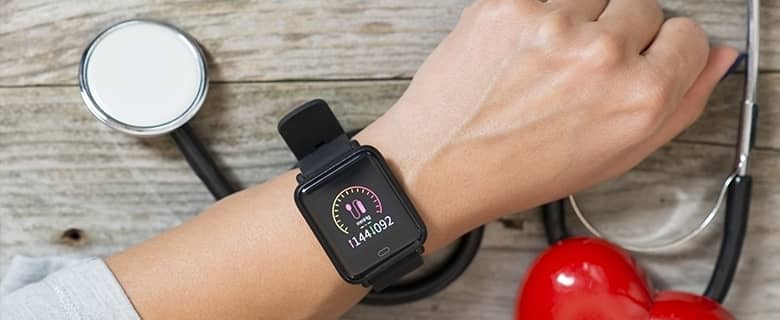Most routine check-ups at the doctor’s office start with a blood pressure reading. This is because the blood pressure levels indicate a lot about the patient’s health. If the reading is either high or low, that may be a pointer to potential health issues.
What Is High Blood Pressure?
Blood pressure is the force with which the blood circulates throughout the body or more precisely the amount of pressure exerted on the arteries when the blood flows through them. Normal pressure is essential for the smooth flow of blood that carries life-giving oxygen and other vital nutrients all over the body. The problem arises when the blood pressure in the arteries increases to unhealthy levels and when the heart needs to exert more pressure to pump the same amount of blood. This condition is called high blood pressure or hypertension.
Blood Pressure Readings
Blood pressure readings have two numbers, the upper/first number is systolic blood pressure or the heart beating number and the lower/second number is the diastolic blood pressure or the heart resting number between beats. It is measured in millimeters of mercury (mm Hg) with the normal blood pressure level being 120/80 mm Hg. When the blood pressure measurement reads 130 systolic or higher or 80 diastolic or higher and stays high during continuous readings then that person will be diagnosed with high blood pressure or hypertension.
What Causes High Blood Pressure? Are There Any Hypertension Symptoms?
Most people who suffer from hypertension do not show any visible high blood pressure symptoms. Also in almost 90% of cases, there are no known causes of hypertension. But some warning signs of high BP that should not be overlooked include dizziness, headaches, blurred vision, trouble breathing, chest pain, etc. Blood pressure changes naturally many times during the day. Most of these changes are normal and the person may not experience any unusual signs or symptoms. But, if the blood pressure readings are really high or really low then the doctor should be consulted immediately. These highly fluctuating blood pressure readings may be a cause for concern as they might point to more serious health problems.
So, What Are The Causes Of Sudden High Blood Pressure?
A temporary rise in blood pressure (or even a dip) may be the result of several factors such as:
Stress –
Stressful situations can cause blood pressure to spike temporarily. When a person is stressed out, the body produces a surge of hormones which causes the heart to beat faster and narrows the blood vessels resulting in temporarily increasing the blood pressure. Although there is no proof that stress by itself causes long-term high blood pressure, reacting to stress in an unhealthy manner can increase the risk of high blood pressure, heart attacks and strokes. An increase in blood pressure that is related to stress often goes back to the normal range when the person is no longer anxious or worried. But these temporary fluctuations in blood pressure, no matter how normal, can cause damage to the heart, kidneys, and arteries much in the same way of long-term high blood pressure.
Medicines –
Certain over the counter and prescription medications can impact blood pressure. Some blood pressure medicines and diuretics lower blood pressure whereas some allergy and cold medications can increase blood pressure.
Physical Activity –
It is known that exercise can increase blood pressure (systolic) but the effects are temporary and once the workout is done the blood pressure gradually returns to normal. The quicker the blood pressure returns to its resting level, the healthier the person is. Swimming, cycling and running put additional demands on the cardiovascular system and that’s why the muscles need more oxygen than when the body is at rest resulting in quick breathing. During these activities, the heart has to pump harder and faster to deliver oxygen and that is why the systolic blood pressureincreases temporarily. Other physical activities such as talking, laughter and even sex can cause blood pressure fluctuations.
Food & Drink –
The body’s health is directly related to what is eaten. The same is true for blood pressure readings. Foods high in Tyramine, a substance found in aged foods, can increase blood pressure. These include fermented, pickled or cured foods.
Adrenal Issues –
Adrenal glands (endocrine glands), situated above the kidneys, produce a variety of hormones, such as adrenaline and the steroids aldosterone and cortisol, that regulate the metabolism, immune system, blood pressure, response to stress and other essential functions. Adrenal fatigue occurs when hormone production is low which can cause the blood pressure to fall. In contrast, an overactive adrenal system can cause sudden spikes in blood pressure and hypertension.
White Coat Syndrome –
White coat syndrome also known as white coat hypertensionis a phenomenon in which people have a blood pressure reading above the normal range, in a clinical setting, though they do not display the same in other settings. The temporary rise in blood pressure is due to anxiety during visiting a doctor.
How To Manage Fluctuating Blood Pressure?
Unless the blood pressure levels are extremely high (or low) and require immediate medical attention, temporarily fluctuating blood pressure levels can be managed by:
-
Regular Monitoring Of Blood Pressure Readings –
High or low, fluctuating blood pressure levels may indicate potential health problems so it is necessary to regularly monitor the readings.
-
Making Lifestyle Changes –
The first line of treatment for changing blood pressure readings is adopting a healthy lifestyle (diet, exercise, sleep and less stress).
-
Taking Medications Prescribed By The Doctor –
If the healthy lifestyle change is not sufficient to stabilize the blood pressure then it is necessary to take the medicines prescribed by the doctor.
Factors That Can Cause A Sudden Increase In Blood Pressure
Some factors and conditions that can increase the risk of fluctuating blood pressure are:
- Anxiety
- Over exercising
- High salt intake
- Dehydration
- Excessive alcohol consumption
- Thyroid
- Smoking and use of tobacco
- Cardiovascular porblems
- Ineffective blood pressure medication
- Working through the night
- Diabetes
- High stress levels
- Pregnancy
Disclaimer
The information contained in this article is to educate, spread awareness in relation to hypertension and other diseases to the public at large. The contents of this article are created and developed by BPinControl.in through its authors, which has necessary, authorisations, license, approvals, permits etc to allow usage of this articles on The Website. The views and opinions expressed in this article are views, opinions of the respective authors and are independently endorsed by doctors. Although great care has been taken in compiling and checking the information in this article, The Website shall not be responsible, or in any way liable for any errors, omissions or inaccuracies in this article whether arising from negligence or otherwise, or for any consequences arising therefrom. The content of this article is not a substitute for any medical advice. The Website shall not be held responsible or liable for any consequence arising out of reliance on the information provided in the article.




